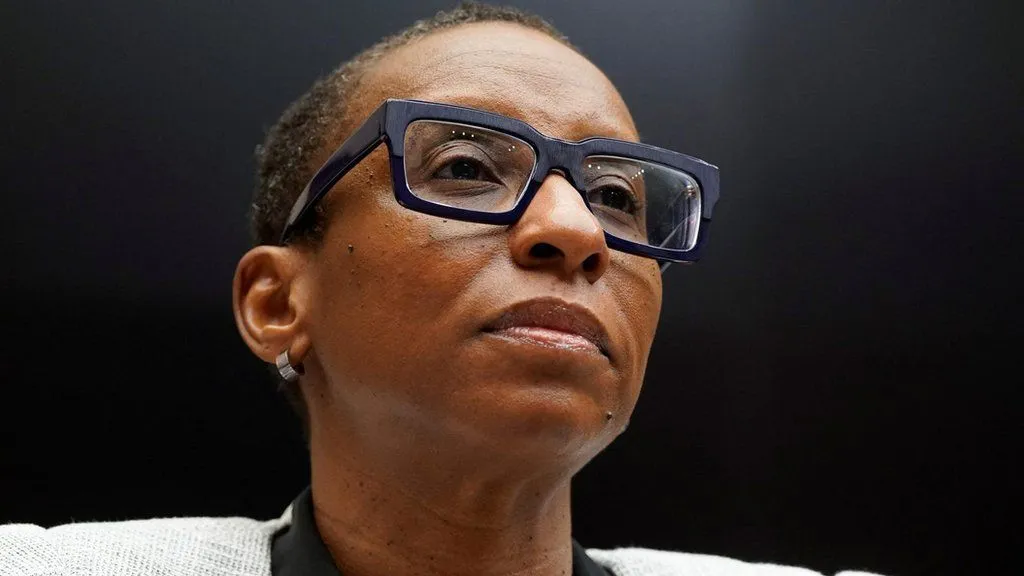
Harvard President Claudine Gay says she won’t quit over Congress Row
Claudine Gay, the president of Harvard University, is expected to remain in her position in spite of the growing backlash following her appearance before Congress last week. After failing to clarify whether or not students asking for the murder of Jews would face consequences, Dr. Gay came under pressure to resign. However, over the weekend, around 700 employees supported her in a letter. The board of the school issued a statement on Tuesday, “reaffirm[ing] our support” for her leadership.
The Harvard Corporation, the university’s highest governing board, stated, “Our extensive deliberations affirm our confidence that President Gay is the right leader to help our community heal and to address the very serious societal issues we are facing.” We all firmly support President Gay at this turbulent and trying period,” the 13-member board continued.
Dr. Gay’s announcement that she will continue to serve as president comes just a few days after Elizabeth Magill, the president of the University of Pennsylvania (UPenn), announced her resignation due to a comparable reaction stemming from her own congressional hearing. Dr. Gay testified last week at a House of Representatives hearing on antisemitism alongside Ms. Magill and Sally Kornbluth, the president of Massachusetts Institute of Technology.
Under intense interrogation from Republican Congresswoman Elise Stefanik, Dr. Gay stated that she thought it disgusting when someone called for the elimination of Jews, but it was debatable whether or not it would violate Harvard’s code of conduct involving harassment and bullying. Soon later, she expressed her regret in an interview with the Crimson, Harvard’s student newspaper. I don’t know how you could feel anything other than remorse when words magnify suffering and anguish,” she remarked.
The Harvard Corporation said in a statement that Dr. Gay’s original remarks “should have been an immediate, direct, and unequivocal condemnation” and that demands for genocide were “despicable”. However, Harvard’s president had expressed regret for the way she handled her hearing before Congress, according to the school. We are convinced that President Gay will guide Harvard towards completing this crucial job. Harvard’s objective is to advance knowledge, research, and discovery that will help solve profound social concerns and foster constructive conversation,” the board stated.
In a petition signed over the weekend by about seven hundred academics, Harvard was urged to “resist political pressures that are at odds with Harvard’s commitment to academic freedom” and to retain Dr. Gay as president. Harvard Professor Alison Frank Johnson, one of the signatories, told the BBC’s Newshour programme that she and other signatories were motivated to join the petition in favour of the president by the “question of university autonomy” despite Dr. Gay providing a “catastrophic set of answers” at the hearing.
“I don’t want to defend what I believe to be a disastrous set of replies that didn’t do credit to her or our university. However, she said, “I don’t think they really show a moral degeneration on the part of the White House or the university administration that calls for her dismissal.” However, the Harvard Corporation came under fire from StopAntisemitism, a non-profit organisation dedicated to eradicating discrimination against Jews, for “failing to hold” Dr. Gay responsible.
“The Corporation’s decision serves only to greenlight more Jew-hatred on campus,” the organisation stated. “StopAntisemitism continues to call for President Gay’s resignation and urges the Corporation to reconsider its decision and hire someone who is committed to protecting every Harvard student.” Meanwhile, the university president’s responses at the session were deemed “abhorrent” by over 70 lawmakers, the majority of whom were Republicans, who demanded that Dr. Gay step down.
Following the conflict in Gaza, pro-Palestinian and pro-Israeli demonstrations have become commonplace on US college campuses, sparking worries about antisemitism and Islamophobia. Dr. Gay became Harvard University’s first black president in its 368-year history when he was appointed in July. Her parents are from Haiti, and she studied economics at Stanford University, where she was a professor before.
After graduating from Harvard with a PhD in administration, Dr. Gay started teaching African and African-American Studies there in 2007. Dr. Gay soon gained substantial support, but Elizabeth Magill faced intense pressure from without to step down. Shortly after the University of Pennsylvania’s president announced her resignation, a significant donor withdrew a $100 million (£80 million) donation in protest of her remarks.
Some of the school’s largest benefactors had criticised her before to her congressional hearing, claiming she had not criticised the Hamas assaults swiftly enough or strongly enough. Crisis management consultant Molly McPherson told the BBC that the reason why one president of their two colleges is still in office while the other has left is also due to bigger dynamics within their respective campuses.
“Each institution has their own set of values, their own donors and donor expectations,” she stated. “Harvard was ready to support Gay, and UPenn was ready to let Magill go.” However, she acknowledged that it probably did not help that Ms. Magill opted to respond to the criticism of her testimony. The school newspaper allowed Dr. Gay to address the student population directly, but Ms. Magill released an apologetic video that she described as “awkward, stilted, unrehearsed and scripted.”
The clip “lacked all authenticity and seemed removed from what the real problem was, and that is the disconnection between her views and the protection of the students” , said Ms McPherson. She noted that Dr. Gay’s answer was a sharp contrast. She said, “Her comments were relatable.” “She chose a proactive approach.”
